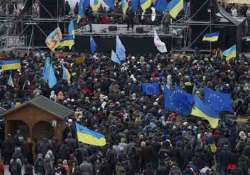Kiev: Thousands of Ukrainian protesters on Monday besieged government buildings in Kiev and called for the ouster of the prime minister and his Cabinet, as anger at the president's decision to ditch a deal for closer ties with the European Union gripped other parts of the country and threatened his rule.
The entrances to the Cabinet and central bank buildings were blocked, after a huge rally in the capital by hundreds of thousands Sunday.
That demonstration was mostly peaceful, until a group of protesters tried to storm President Viktor Yanukovych's office.
After hours of scuffles, police chased protesters away with tear gas and truncheons, injuring dozens.
It was a violent police action against protesters early Saturday that galvanized the latest round of protests, whose aim is to bring down the president and his government.
At least three lawmakers of the governing Party of Regions have quit in protest and one of them, Inna Bohoslovska, previously a vocal government supporter, called on other legislators to leave the party.
A top Agriculture Ministry official also resigned Monday.
The opposition was hoping to oust the Cabinet of Prime Minister Mykola Azarov during a confidence vote in parliament on Tuesday.
The opposition, which now controls about 170 seats, would need 226 votes in the 450-seat Rada.
Oleksandr Yefremov, head of the Party of Regions faction in parliament, said lawmakers would discuss the situation Tuesday morning and might then put a no-confidence motion up for a vote.
At the same time, he said there were no grounds to dismiss the government.
“Our goal is to make sure that the people on Maidan (Independence Square, where the protests are taking place) calm down,” Yefremov said.
Azarov's spokesman Vitaly Lukyanenko said the government wasn't planning to impose a state of emergency.
He told the Interfax news agency that because government employees can't access the Cabinet building, they would work online.
The turbulent situation doesn't bode well for Ukraine's troubled economy, which has been in recession for more than a year.
“The blockade of government offices and the National Bank of Ukraine, and the risk of a general strike, leaves me concerned now over Ukraine's ability to pay its way in the very short term,” said Tim Ash, chief emerging markets economist at Standard Bank in London.
Opposition calls for a strike were being headed by local governments in western Ukraine, where most people speak Ukrainian and lean toward the EU.
In the industrial east of the country, most people tend to speak Russian and have a closer affinity for Russia.
Officials in the western cities of Lviv, Ivano-Frankivsk and Ternopil announced they were going on strike and called on their residents to turn out for protests.
The mayor of Lviv warned that police in his city would take off their uniforms and defend the city if the central government sent reinforcements.
Scores of protesters from Lviv and elsewhere in western Ukraine have headed to Kiev by train and car to take part in the rallies.
Latest World News
